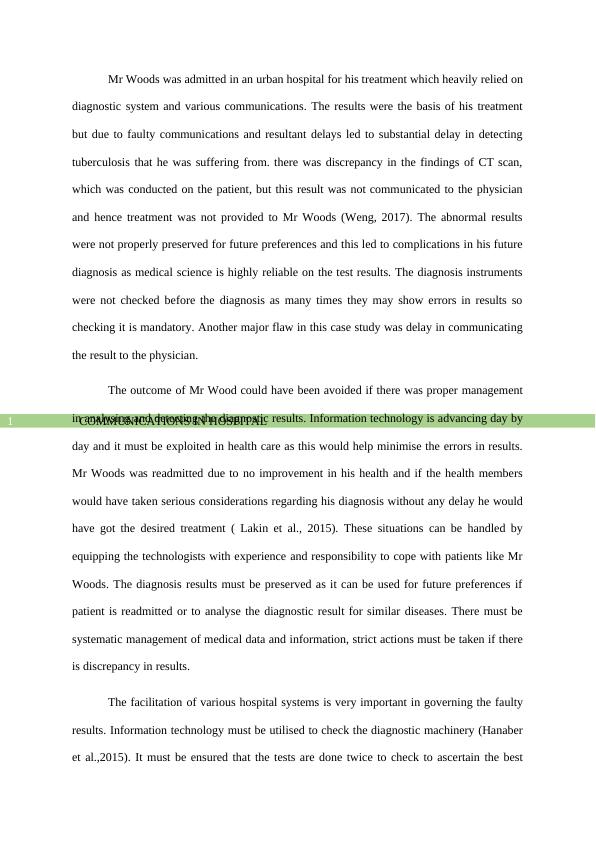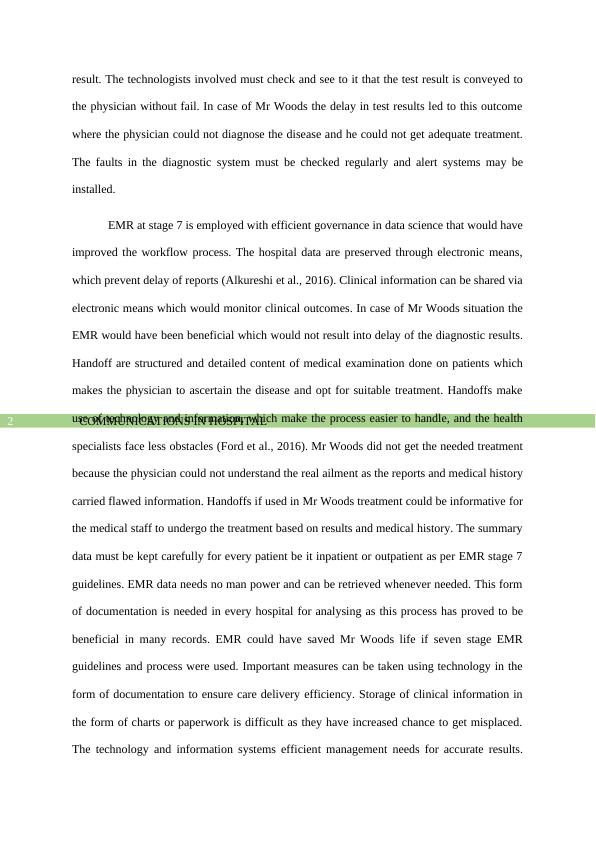Communications in Hospital: Importance of Efficient Management
6 Pages1179 Words315 Views
Added on 2022-11-16
About This Document
This article discusses the importance of efficient management of communications in hospitals. It highlights the consequences of faulty communications and suggests the use of information technology to minimize errors in results. The article also emphasizes the need for systematic management of medical data and information.
Communications in Hospital: Importance of Efficient Management
Added on 2022-11-16
ShareRelated Documents
Running head: Communications in hospital
Communications in hospital
Name of the student:
Name of the university:
Authors notes:
Communications in hospital
Name of the student:
Name of the university:
Authors notes:

COMMUNICATIONS IN HOSPITAL1
Mr Woods was admitted in an urban hospital for his treatment which heavily relied on
diagnostic system and various communications. The results were the basis of his treatment
but due to faulty communications and resultant delays led to substantial delay in detecting
tuberculosis that he was suffering from. there was discrepancy in the findings of CT scan,
which was conducted on the patient, but this result was not communicated to the physician
and hence treatment was not provided to Mr Woods (Weng, 2017). The abnormal results
were not properly preserved for future preferences and this led to complications in his future
diagnosis as medical science is highly reliable on the test results. The diagnosis instruments
were not checked before the diagnosis as many times they may show errors in results so
checking it is mandatory. Another major flaw in this case study was delay in communicating
the result to the physician.
The outcome of Mr Wood could have been avoided if there was proper management
in analysing and detecting the diagnostic results. Information technology is advancing day by
day and it must be exploited in health care as this would help minimise the errors in results.
Mr Woods was readmitted due to no improvement in his health and if the health members
would have taken serious considerations regarding his diagnosis without any delay he would
have got the desired treatment ( Lakin et al., 2015). These situations can be handled by
equipping the technologists with experience and responsibility to cope with patients like Mr
Woods. The diagnosis results must be preserved as it can be used for future preferences if
patient is readmitted or to analyse the diagnostic result for similar diseases. There must be
systematic management of medical data and information, strict actions must be taken if there
is discrepancy in results.
The facilitation of various hospital systems is very important in governing the faulty
results. Information technology must be utilised to check the diagnostic machinery (Hanaber
et al.,2015). It must be ensured that the tests are done twice to check to ascertain the best
Mr Woods was admitted in an urban hospital for his treatment which heavily relied on
diagnostic system and various communications. The results were the basis of his treatment
but due to faulty communications and resultant delays led to substantial delay in detecting
tuberculosis that he was suffering from. there was discrepancy in the findings of CT scan,
which was conducted on the patient, but this result was not communicated to the physician
and hence treatment was not provided to Mr Woods (Weng, 2017). The abnormal results
were not properly preserved for future preferences and this led to complications in his future
diagnosis as medical science is highly reliable on the test results. The diagnosis instruments
were not checked before the diagnosis as many times they may show errors in results so
checking it is mandatory. Another major flaw in this case study was delay in communicating
the result to the physician.
The outcome of Mr Wood could have been avoided if there was proper management
in analysing and detecting the diagnostic results. Information technology is advancing day by
day and it must be exploited in health care as this would help minimise the errors in results.
Mr Woods was readmitted due to no improvement in his health and if the health members
would have taken serious considerations regarding his diagnosis without any delay he would
have got the desired treatment ( Lakin et al., 2015). These situations can be handled by
equipping the technologists with experience and responsibility to cope with patients like Mr
Woods. The diagnosis results must be preserved as it can be used for future preferences if
patient is readmitted or to analyse the diagnostic result for similar diseases. There must be
systematic management of medical data and information, strict actions must be taken if there
is discrepancy in results.
The facilitation of various hospital systems is very important in governing the faulty
results. Information technology must be utilised to check the diagnostic machinery (Hanaber
et al.,2015). It must be ensured that the tests are done twice to check to ascertain the best

COMMUNICATIONS IN HOSPITAL2
result. The technologists involved must check and see to it that the test result is conveyed to
the physician without fail. In case of Mr Woods the delay in test results led to this outcome
where the physician could not diagnose the disease and he could not get adequate treatment.
The faults in the diagnostic system must be checked regularly and alert systems may be
installed.
EMR at stage 7 is employed with efficient governance in data science that would have
improved the workflow process. The hospital data are preserved through electronic means,
which prevent delay of reports (Alkureshi et al., 2016). Clinical information can be shared via
electronic means which would monitor clinical outcomes. In case of Mr Woods situation the
EMR would have been beneficial which would not result into delay of the diagnostic results.
Handoff are structured and detailed content of medical examination done on patients which
makes the physician to ascertain the disease and opt for suitable treatment. Handoffs make
use of technology and information, which make the process easier to handle, and the health
specialists face less obstacles (Ford et al., 2016). Mr Woods did not get the needed treatment
because the physician could not understand the real ailment as the reports and medical history
carried flawed information. Handoffs if used in Mr Woods treatment could be informative for
the medical staff to undergo the treatment based on results and medical history. The summary
data must be kept carefully for every patient be it inpatient or outpatient as per EMR stage 7
guidelines. EMR data needs no man power and can be retrieved whenever needed. This form
of documentation is needed in every hospital for analysing as this process has proved to be
beneficial in many records. EMR could have saved Mr Woods life if seven stage EMR
guidelines and process were used. Important measures can be taken using technology in the
form of documentation to ensure care delivery efficiency. Storage of clinical information in
the form of charts or paperwork is difficult as they have increased chance to get misplaced.
The technology and information systems efficient management needs for accurate results.
result. The technologists involved must check and see to it that the test result is conveyed to
the physician without fail. In case of Mr Woods the delay in test results led to this outcome
where the physician could not diagnose the disease and he could not get adequate treatment.
The faults in the diagnostic system must be checked regularly and alert systems may be
installed.
EMR at stage 7 is employed with efficient governance in data science that would have
improved the workflow process. The hospital data are preserved through electronic means,
which prevent delay of reports (Alkureshi et al., 2016). Clinical information can be shared via
electronic means which would monitor clinical outcomes. In case of Mr Woods situation the
EMR would have been beneficial which would not result into delay of the diagnostic results.
Handoff are structured and detailed content of medical examination done on patients which
makes the physician to ascertain the disease and opt for suitable treatment. Handoffs make
use of technology and information, which make the process easier to handle, and the health
specialists face less obstacles (Ford et al., 2016). Mr Woods did not get the needed treatment
because the physician could not understand the real ailment as the reports and medical history
carried flawed information. Handoffs if used in Mr Woods treatment could be informative for
the medical staff to undergo the treatment based on results and medical history. The summary
data must be kept carefully for every patient be it inpatient or outpatient as per EMR stage 7
guidelines. EMR data needs no man power and can be retrieved whenever needed. This form
of documentation is needed in every hospital for analysing as this process has proved to be
beneficial in many records. EMR could have saved Mr Woods life if seven stage EMR
guidelines and process were used. Important measures can be taken using technology in the
form of documentation to ensure care delivery efficiency. Storage of clinical information in
the form of charts or paperwork is difficult as they have increased chance to get misplaced.
The technology and information systems efficient management needs for accurate results.

End of preview
Want to access all the pages? Upload your documents or become a member.
Related Documents
Medical Negligence Case Study: Iturralde v. Hilo Medical Centerlg...
|4
|589
|155
